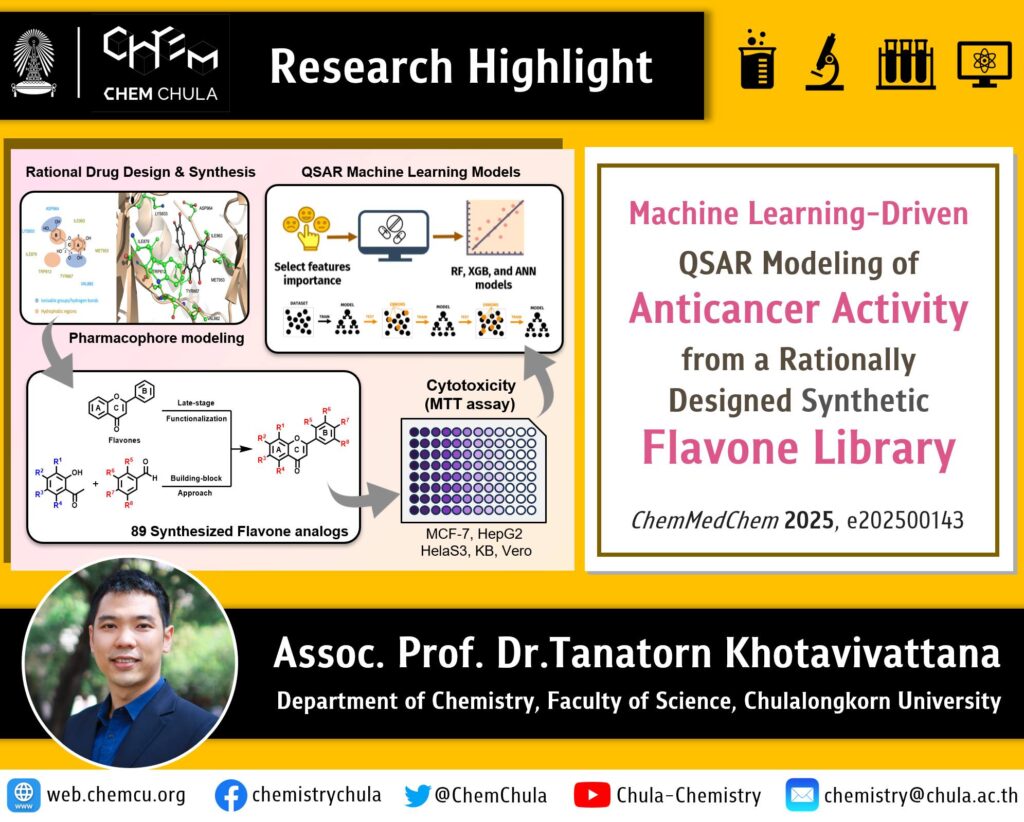As artificial intelligence (AI) ![]() continues to transform medicine and pharmaceuticals, its role in accelerating the discovery of bioactive compounds is becoming increasingly crucial.
continues to transform medicine and pharmaceuticals, its role in accelerating the discovery of bioactive compounds is becoming increasingly crucial.
![]() A research team led by Assoc. Prof. Dr. Tanatorn Khotavivattana from the Department of Chemistry, Faculty of Science, Chulalongkorn University, in collaboration with experts from multiple institutions, designed and synthesized 89 flavone derivatives, followed by biological evaluation against several cancer cell lines: MCF-7 (breast cancer), HepG2 (liver cancer), HeLa-S3 (cervical cancer), and KB (oral cancer), with Vero cells used as a normal-cell control.
A research team led by Assoc. Prof. Dr. Tanatorn Khotavivattana from the Department of Chemistry, Faculty of Science, Chulalongkorn University, in collaboration with experts from multiple institutions, designed and synthesized 89 flavone derivatives, followed by biological evaluation against several cancer cell lines: MCF-7 (breast cancer), HepG2 (liver cancer), HeLa-S3 (cervical cancer), and KB (oral cancer), with Vero cells used as a normal-cell control.
![]() These biological data were used to develop Quantitative Structure–Activity Relationship (QSAR) models using various machine learning algorithms, including Random Forest (RF), Extreme Gradient Boosting (XGBoost), and Artificial Neural Networks (ANNs), to predict anticancer activity (IC₅₀) from chemical structures.
These biological data were used to develop Quantitative Structure–Activity Relationship (QSAR) models using various machine learning algorithms, including Random Forest (RF), Extreme Gradient Boosting (XGBoost), and Artificial Neural Networks (ANNs), to predict anticancer activity (IC₅₀) from chemical structures.
![]() The resulting QSAR models demonstrated strong predictive performance, especially for MCF-7 and HepG2, and provided insights into which molecular features most significantly contributed to cytotoxic activity.
The resulting QSAR models demonstrated strong predictive performance, especially for MCF-7 and HepG2, and provided insights into which molecular features most significantly contributed to cytotoxic activity.
![]() This study highlights the power of AI-driven modeling to guide future compound design—helping reduce experimental workload, time, and cost in anticancer drug discovery.
This study highlights the power of AI-driven modeling to guide future compound design—helping reduce experimental workload, time, and cost in anticancer drug discovery.
- Natthanan Vijara
- Borwornlak Toopradab
- Jantana Yahuafai
- Taweesak Gulchatchai
- Rita Hairani
- Apinya Patigo
- Thanyada Rungrotmongkol
- Sumrit Wacharasindhu
- Warinthorn Chavasiri
- Liyi Shi
- Phornphimon Maitarad
- Ruchuta Ardkhean
- Tanatorn Khotavivattana

